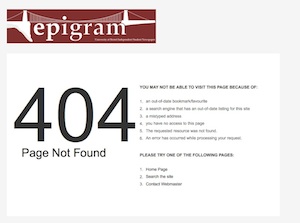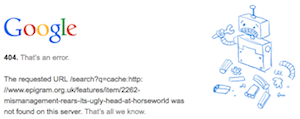 What a curious development in the never-ending saga of management mishaps in the upper echelons of HorseWorld.
What a curious development in the never-ending saga of management mishaps in the upper echelons of HorseWorld.
On Monday the Bristol University newspaper Epigram published an article about recent events at HorseWorld on its website. It covered many of the allegations which The BRISTOLIAN first brought to public attention.
By mid-morning on Tuesday, readers began telling us that the article was no longer being displayed. We attempted to contact Epigram and its editors, the Student Union, the University’s Press Office and the UoB management, to find out what had happened. No one got back to us.
Then a source close to HorseWorld MD Mark ‘Not That One’ Owen told us what seemed by now to be obvious: the article had been pulled after a furious Pinocchiowen was “straight on the phone to the Uni [yesterday] morning” to demand that the article was removed.
We then posted a link to a cached version of the article still available via Google.
Today that Google cache version has also been taken down.
So in support of a free press unhindered by threats, coercion, fear or favour, we present for you here the full text of the article in question [not any more – see notes at the bottom of the page for further info!] – and call upon you, the reader, to decide whether it should have been pulled…
The BRISTOLIAN’s précis of the Max Miller Epigram article ‘Mismanagement rears its ugly head at Horseworld’
There’s a “scandal brewing” at the sixty year-old charity HorseWorld, with fears that it may have to reduce its activities and make more than 25 staff redundant after the failure of its bid for planning consent to permit the sell-off of land to developers. This is in tandem with reductions in income, a situation “mirrored by the fates of charities across the country” as donation levels drop off.
The article also notes that research by the National Council for Voluntary Organisations and the Charities Aid Foundation shows that between 2010 and 2012 charitable giving were down £1.7bn (£2.3bn when adjusted for inflation) to £9.3bn – a plummet of 20% in real terms. This research into the donations nosedive was released shortly after an investigation by the Telegraph newspaper, which showed that the number of “executives receiving six-figure salaries at Britain’s leading aid charities, and those linked to them, rose by nearly 60 per cent from 19 to 30 over the past three years.” The article noted The BRISTOLIAN’s own coverage, in which managing director Mark Owen has been reported as having “played a part in Horseworld losing over £2 million in the last three years.”
The article then summarises some of The BRISTOLIAN’s claims about Owen’s management of HorseWorld, including his starting salary of £60,000 in 2008, his £28,000 company Audi, the hiring of consultants at £525 per day, and his blaming of others for the charity’s predicament. As the author notes, this “does not exactly scream out ‘competent management.’”
Next comes reflection on the overall shrinking of charity donations in the UK during recent recessionary times, pointing out how fundraising website Charity Giving shut down – with a loss of more than £250,000 in donations – and highlighting a report in The Independent which investigated the challenges faced by UK charities “battling not only the effects of economic downturn, but also theft, organised crime, fraud worries and accusations of pure mismanagement.”
The article then crunches some of HorseWorld’s numbers: its income fell by nearly £200k from £1.25mn to £1.06mn in 2010-2012, with voluntary donations dropping from £728,046 to £398,214 over the same period.
Next it is pointed out that Owen’s strategy for rectifying HorseWorld’s financial freefall – an all-or-nothing green belt planning gamble – was about as high-risk as you could get. The phrases “financial mismanagement” and “major mistake” are used.
Finally, the author summarises, suggesting that what has been happening in the management of HorseWorld “is a perfect [but extreme] example of what is happening across the country.” Ultimately, when a charity sees income drying up and managers not acting appropriately, it is the good work which suffers most.


